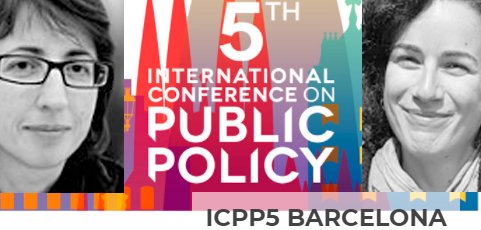Las investigadoras Raquel Gallego-Calderón (Universitat Autónoma de Barcelona) y Lara Maestripieri (Politecnico di Milano/Universitat Autònoma de Barcelona) coordinaran el “Panel Linking social innovation and empowerment: A public policy role?” previsto en la próxima IPPA Conference ICPP5 Barcelona que tendrá lugar del 6 al 8 de julio de 2021.
El panel quiere investigar el papel de la innovación social en el fomento del empoderamiento de las mujeres, con un enfoque específico en las políticas públicas capaces de mejorar las capacidades colectivas e individuales de los ciudadanos.
Objetivos
Open debates in the Welfare State include social investment, equality of opportunities, diversity, equity, or gender equality among others. Recently, social innovation in these areas has raised questions not only on citizens’ empowerment, but also on the capacity of existing public policies to address new demands and challenges in an increasingly complex and uncertain context (Barbieri et al. 2019, Gallego 2019). However, the connection between the research on social innovation and empowerment and the research on public policy has been scarce. We argue that the capabilities approach may help formulating research questions that integrate both strands.
Most of the literature has linked “social innovation” and “empowerment” together, as two sides of the same coin (Moulaert et al., 2016). Social innovation includes practices that generate provision models different from institutionalized public and private sectors, and which are supposed to empower citizens (Grimm et al. 2013). In theory, social innovation aims to empower the communities and the individuals who are involved in its activities (Baglioni and Sinclair, 2015), but this does not necessarily always occur in practice (Blanco and Leon, 2017, Maestripieri, 2017a). Empirical results from studies on the relationship between women’s empowerment and involvement in social innovation have given contrasting results (Cukier, 2018, Maestripieri 2017b).
The missing link between social innovation and empowerment has been a concern in the research on social innovation and on women’s empowerment from a capabilities approach (Cornwall 2016, Maestripieri 2017a,b, Lindberg et at. 2015). Capabilities refer both to the potential and to the actual power of what a person is able to do and achieve in terms of valued choices, and indicates a person’s well-being (Gangas 2016, Sen 1985). Empowerment is conceptualised as an increase in women’s capabilities and is operationalized through the relationship between three elements: resources, agency and achievements (Ibrahim and Alkire, 2007). Citizens’ resources are preconditions that influence their agency, which in turn influences their achievements (outcomes) (Chiappero et al. 2017). Thus, social innovation empowers only those with sufficient resources to participate in it, which deepens inequality a context of retrenchment (Oosterlynck et al. 2013). Therefore, as Ziegler (2018) points out, we need to pay attention to the capabilities conversion factors, among which public policy plays a central role.
Research questions:
How can public policy enhance citizens’ collective and individual capabilities to promote social innovation?
Is public policy intervention a contradiction in terminis with the aims and means of social innovation?
What can public policy learn from social innovation?
Hypotheses:
Hp1. Social innovation leads to inequality when it occurs in a context of welfare retrenchment and reduction of public intervention.
Hp2. Social innovation can have a beneficial spillover over public policy, if it complements the action of the public, raising awareness on potential social needs not covered by current welfare provisions.
Hp3. Social innovation generates women’s empowerment if women are actively involved in the definition of the scope and goal of the social innovation and social innovation occurs in a favourable institutional context in which public policies learn from socially innovative projects.
Do not hesitate to contact lara.maestripieri@polimi.it for any information regarding this panel.






